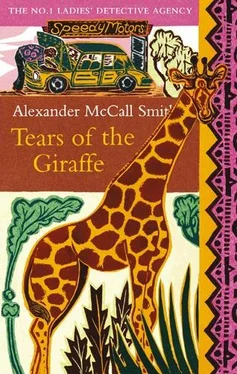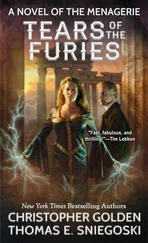Mr J.L.B. Matekoni put down his tool box at the entrance to the pump-house and cautiously pushed the door open. He was careful about places like this because they were very well suited for snakes. Snakes seemed to like machinery, for some reason, and he had more than once discovered a somnolent snake curled around a part of some machine on which he was working. Why they did it, he had no idea; it might have been something to do with warmth and motion. Did snakes dream about some good place for snakes? Did they think that there was a heaven for snakes somewhere, where everything was down at ground level and there was nobody to tread on them?
His eyes took a few moments to accustom themselves to the dark of the interior, but after a while he saw that there was nothing untoward inside. The pump was driven by a large flywheel which was powered by an antiquated diesel engine. Mr J.L.B. Matekoni sighed. This was the trouble. Old diesel engines were generally reliable, but there came a point in their existence when they simply had to be pensioned off. He had hinted at this to Mma Potokwane, but she had always come up with reasons why money should be spent on other, more pressing projects.
"But water is the most important thing of all," said Mr J.L.B. Matekoni. "If you can't water your vegetables, then what are the children going to eat?"
"God will provide," said Mma Potokwane calmly. "He will send us a new engine one day."
"Maybe," said Mr J.L.B. Matekoni. "But then maybe not. God is sometimes not very interested in engines. I fix cars for quite a few ministers of religion, and they all have trouble. God's servants are not very good drivers."
Now, confronted with the evidence of diesel mortality, he retrieved his tool box, extracted an adjustable spanner, and began to remove the engine casing. Soon he was completely absorbed in his task, like a surgeon above the anaesthetised patient, stripping the engine to its solid, metallic heart. It had been a fine engine in its day, the product of a factory somewhere unimaginably far away-a loyal engine, an engine of character. Every engine seemed to be Japanese these days, and made by robots. Of course these were reliable, because the parts were so finely turned and so obedient, but for a man like Mr J.L.B. Matekoni those engines were as bland as sliced white bread. There was nothing in them, no roughage, no idio-syncracies. And as a result, there was no challenge in fixing a Japanese engine.
He had often thought how sad it was that the next generation of mechanics might never have to fix one of these old engines. They were all trained to fix the modern engines which needed computers to find out their troubles. When somebody came in to the garage with a new Mercedes-Benz, Mr J.L.B. Matekoni's heart sank. He could no longer deal with such cars as he had none of these new diagnostic machines that one needed. Without such a machine, how could he tell if a tiny silicon chip in some inaccessible part of the engine was sending out the wrong signal? He felt tempted to say that such drivers should get a computer to fix their car, not a live mechanic, but of course he did not, and he would do his best with the gleaming expanse of steel which nestled under the bonnets of such cars. But his heart was never in it.
Mr J.L.B. Matekoni had now removed the pump engine's cylinder heads and was peering into the cylinders themselves. It was exactly what he had imagined; they were both coked up and would need a rebore before too long. And when the pistons themselves were removed he saw that the rings were pitted and worn, as if affected by arthritis. This would affect the engine's efficiency drastically, which meant wasted fuel and less water for the orphans' vegetables. He would have to do what he could. He would replace some of the engine seals to staunch the oil loss and he would arrange for the engine to be brought in some time for a rebore. But there would come a time when none of this would help, and he thought they would then simply have to buy a new engine.
There was a sound behind him, and he was startled. The pump-house was a quiet place, and all that he had heard so far was the call of birds in the acacia trees. This was a human noise. He looked round, but there was nothing. Then it came again, drifting through the bush, a squeaking noise as if from an unoiled wheel. Perhaps one of the orphans was wheeling a wheelbarrow or pushing one of those toy cars which children liked to fashion out of bits of old wire and tin.
Mr J.L.B. Matekoni wiped his hands on a piece of rag and stuffed the rag back into his pocket. The noise seemed to be coming closer now, and then he saw it, emerging from the scrub bush that obscured the twists of the path: a wheelchair, in which a girl was sitting, propelling the chair herself. When she looked up from the path ahead of her and saw Mr J.L.B. Matekoni she stopped, her hands gripping the rims of the wheels. For a moment they stared at one another, and then she smiled and began to make her way over the last few yards of pathway.
She greeted him politely, as a well-brought-up child would do.
"I hope that you are well, Rra," she said, offering her right hand while her left hand laid across the forearm in a gesture of respect.
They shook hands.
"I hope that my hands are not too oily," said Mr J.L.B. Matekoni. "I have been working on the pump."
The girl nodded. "I have brought you some water, Rra. Mma Potokwane said that you had come out here without anything to drink and you might be thirsty."
She reached into a bag that was slung under the seat of the chair and extracted a bottle.
Mr J.L.B. Matekoni took the water gratefully. He had just begun to feel thirsty and was regretting his failure to bring water with him. He took a swig from the bottle, watching the girl as he drank. She was still very young-about eleven or twelve, he thought-and she had a pleasant, open face. Her hair had been braided, and there were beads worked into the knots. She wore a faded blue dress, almost bleached to white by repeated washings, and a pair of scruffy tackles on her feet.
"Do you live here?" he asked. "On the farm?"
She nodded. "I have been here nearly one year," she answered. "I am here with my young brother. He is only five."
"Where did you come from?"
She lowered her gaze. "We came from up near Francistown. My mother is late. She died three years ago, when I was nine. We lived with a woman, in her yard. Then she told us we had to go."
Mr J.L.B. Matekoni said nothing. Mma Potokwane had told him the stories of some of the orphans, and each time he found that it made his heart smart with pain. In traditional society there was no such thing as an unwanted child; everybody would be looked after by somebody. But things were changing, and now there were orphans. This was particularly so now that there was this disease which was stalking through Africa. There were many more children now without parents and the orphan farm might be the only place for some of them to go. Is this what had happened to this girl? And why was she in a wheelchair?
He stopped his line of thought. There was no point in speculating about things which one could do little to help. There were more immediate questions to be answered, such as why was the wheelchair making such an odd noise.
"Your chair is squeaking," he said. "Does it always do that?"
She shook her head. "It started a few weeks ago. I think there is something wrong with it."
Mr J.L.B. Matekoni went down on his haunches and examined the wheels. He had never fixed a wheelchair before, but it was obvious to him what the problem was. The bearings were dry and dusty-a little oil would work wonders there- and the brake was catching. That would explain the noise.
"I shall lift you out," he said. "You can sit under the tree while I fix this chair for you."
Читать дальше









